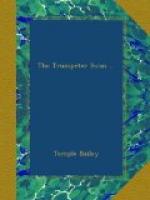STUFFED BIRDS
I
The Country Club was, as Judge Bannister had been the first to declare, “an excrescence.”
Under the old regime, there had been no need for country clubs. The houses on the great estates had been thrown open for the county families and their friends. There had been meat and drink for man and beast.
The servant problem had, however, in these latter days, put a curb on generous impulse. There were no more niggers underfoot, and hospitality was necessarily curtailed. The people who at the time of the August Horse Show had once packed great hampers with delicious foods, and who had feasted under the trees amid all the loveliness of mellow-tinted hills, now ordered by telephone a luncheon of cut-and-dried courses, and motored down to eat it. After that, they looked at the horses, and with the feeling upon them of the futility of such shows yawned a bit. In due season, they held, the horse would be as extinct as the Dodo, and as mythical as the Centaur.
The Judge argued hotly for the things which had been. Love of the horse was bred in the bone of Old Dominion men. He swore by all the gods that when he had to part with his bays and ride behind gasoline, he would be ready to die.
Becky agreed with her grandfather. She adored the old traditions, and she adored the Judge. She spent two months of every year with him in his square brick house in Albemarle surrounded by unprofitable acres. The remaining two months of her vacation were given to her mother’s father, Admiral Meredith, whose fortune had come down to him from whale-hunting ancestors. The Admiral lived also in a square brick house, but it had no acres, for it was on the Main Street of Nantucket town, with a Captain’s walk on top, and a spiral staircase piercing its middle.
The other eight months of the year Becky had spent at school in an old convent in Georgetown. She was a Protestant and a Presbyterian; the Nantucket grandfather was a Unitarian of Quaker stock, Judge Bannister was High Church, and it was his wife’s Presbyterianism which had been handed down to Becky. Religion had therefore nothing to do with her residence at the school. A great many of the Bannister girls had been educated at convents, and when a Bannister had done a thing once it was apt to be done again.
Becky was nineteen, and her school days were just over. She knew nothing of men, she knew nothing indeed of life. The world was to her an open sea, to sail its trackless wastes she had only a cockle-shell of dreams.
“If anybody,” said Judge Bannister, on the first day of the Horse Show, “thinks I am going to eat dabs of things at the club when I can have Mandy to cook for me, they think wrong.”
He gave orders, therefore, which belonged to more opulent days, when his father’s estate had swarmed with blacks. There was now in the Judge’s household only Mandy, the cook, and Calvin, her husband. Mandy sat up half the night to bake a cake, and Calvin killed chickens at dawn, and dressed them, and pounded the dough for biscuits on a marble slab, and helped his wife with the mayonnaise.




